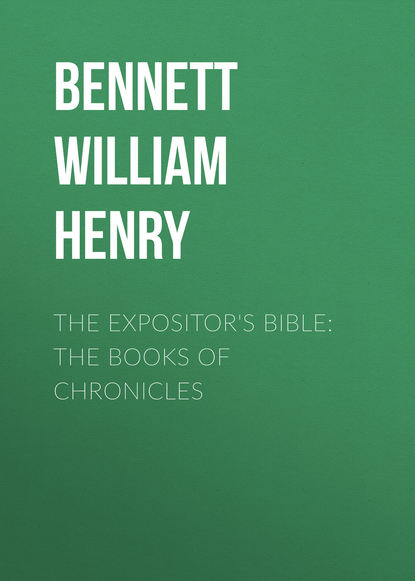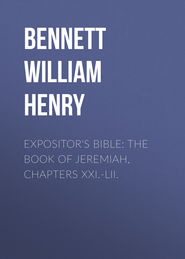По всем вопросам обращайтесь на: info@litportal.ru
(©) 2003-2024.
✖
The Expositor's Bible: The Books of Chronicles
Настройки чтения
Размер шрифта
Высота строк
Поля
Josiah's passover, like that of Hezekiah, was followed by a formidable foreign invasion; but whereas Hezekiah was rewarded for renewed loyalty by a triumphant deliverance, Josiah was defeated and slain. These facts subject the chronicler's theory of retribution to a severe strain. His perplexity finds pathetic expression in the opening words of the new section, “After all this,” after all the idols had been put away, after the celebration of the most magnificent Passover the monarchy had ever seen. After all this, when we looked for the promised rewards of piety – for fertile seasons, peace and prosperity at home, victory and dominion abroad, tribute from subject peoples, and wealth from successful commerce – after all this, the rout of the armies of Jehovah at Megiddo, the flight and death of the wounded king, the lamentation over Josiah, the exaltation of a nominee of Pharaoh to the throne, and the payment of tribute to the Egyptian king. The chronicler has no complete explanation of this painful mystery, but he does what he can to meet the difficulties of the case. Like the great prophets in similar instances, he regards the heathen king as charged with a Divine commission. Pharaoh's appeal to Josiah to remain neutral should have been received by the Jewish king as an authoritative message from Jehovah. It was the failure to discern in a heathen king the mouthpiece and prophet of Jehovah that cost Josiah his life and Judah its liberty.
The chronicler had no motive for lingering over the last sad days of the monarchy; the rest of his narrative is almost entirely abridged from the book of Kings. Jehoahaz, Jehoiakim, Jehoiachin, and Zedekiah pass over the scene in rapid and melancholy succession. In the case of Jehoahaz, who only reigned three months, the chronicler omits the unfavourable judgment recorded in the book of Kings; but he repeats it for the other three, even for the poor lad of eight[437 - Jehoiachin. The ordinary reading in 2 Kings xxiv. makes him eighteen.] who was carried away captive after a reign of three months and ten days. The chronicler had not learnt that kings can do no wrong; on the other hand, the ungodly policy of Jehoiachin's ministers is labelled with the name of the boy-sovereign.
Each of these kings in turn was deposed and carried away into captivity, unless indeed Jehoiakim is an exception. In the book of Kings we are told that he slept with his fathers, i. e., that he died and was buried in the royal tombs at Jerusalem, a statement which the LXX. inserts here also, specifying, however, that he was buried in the garden of Uzza. If the pious Josiah were punished for a single error by defeat and death, why was the wicked Jehoiakim allowed to reign till the end of his life and then die in his bed? The chronicler's information differed from that of the earlier narrative in a way that removed, or at any rate suppressed the difficulty. He omits the statement that Jehoiakim slept with his fathers, and tells us[438 - 2 xxxvi. 6b, peculiar to Chronicles.] that Nebuchadnezzar bound him in fetters to carry him to Babylon. Casual readers would naturally suppose that this purpose was carried out, and that the Divine justice was satisfied by Jehoiakim's death in captivity; and yet if they compared this passage with that in the book of Kings, it might occur to them that after the king had been put in chains something might have led Nebuchadnezzar to change his mind, or, like Manasseh, Jehoiakim might have repented and been allowed to return. But it is very doubtful whether the chronicler's authorities contemplated the possibility of such an interpretation; it is scarcely fair to credit them with all the subtle devices of modern commentators.
The real conclusion of the chronicler's history of the kings of the house of David is a summary of the sins of the last days of the monarchy and of the history of its final ruin in xxxvi. 14-20.[439 - Mostly peculiar to Chronicles.] All the chief of the priests and of the people were given over to the abominations of idolatry; and in spite of constant and urgent admonitions from the prophets of Jehovah, they hardened their hearts, and mocked the messengers of God, and despised His words, and misused His prophets, until the wrath of Jehovah arose against His people, and there was no healing.
However, to this peroration a note is added that the length of the Captivity was fixed at seventy years, in order that the land might “enjoy her sabbaths.” This note rests upon Lev. xxv. 1-7, according to which the land was to be left fallow every seventh year. The seventy years captivity would compensate for seventy periods of six years each during which no sabbatical years had been observed. Thus the Captivity, with the four hundred and twenty previous years of neglect, would be equivalent to seventy sabbatical periods. There is no economy in keeping back what is due to God.
Moreover, the editor who separated Chronicles from the book of Ezra and Nehemiah was loath to allow the first part of the history to end in a gloomy record of sin and ruin. Modern Jews, in reading the last chapter of Isaiah, rather than conclude with the ill-omened words of the last two verses, repeat a previous portion of the chapter. So here to the history of the ruin of Jerusalem the editor has appended two verses from the opening of the book of Ezra, which contain the decree of Cyrus authorising the return from the Captivity. And thus Chronicles concludes in the middle of a sentence which is completed in the book of Ezra: “Who is there among you of all his people? Jehovah his God be with him, and let him go up…”
Such a conclusion suggests two considerations which will form a fitting close to our exposition. Chronicles is not a finished work; it has no formal end; it rather breaks off abruptly like an interrupted diary. In like manner the book of Kings concludes with a note as to the treatment of the captive Jehoiachin at Babylon: the last verse runs, “And for his allowance there was a continual allowance given him of the king, every day a portion, all the days of his life.” The book of Nehemiah has a short final prayer: “Remember me, O my God, for good”; but the preceding paragraph is simply occupied with the arrangements for the wood offering and the first-fruits. So in the New Testament the history of the Church breaks off with the statement that St. Paul abode two whole years in his own hired house, preaching the kingdom of God. The sacred writers recognise the continuity of God's dealings with His people; they do not suggest that one period can be marked off by a clear dividing line or interval from another. Each historian leaves, as it were, the loose ends of his work ready to be taken up and continued by his successors. The Holy Spirit seeks to stimulate the Church to a forward outlook, that it may expect and work for a future wherein the power and grace of God will be no less manifest than in the past. Moreover, the final editor of Chronicles has shown himself unwilling that the book should conclude with a gloomy record of sin and ruin, and has appended a few lines to remind his readers of the new life of faith and hope that lay beyond the Captivity. In so doing, he has echoed the key-note of prophecy: ever beyond man's transgression and punishment the prophets saw the vision of his forgiveness and restoration to God.
notes
1
Cf. Ezra; Nehemiah; Esther, by Professor Adeney, in “Expositor's Bible.”
2
Ezra iii. 12.
3
Isa. lxvi. 22.
4
Quoted for Asa (2 Chron. xvi. 11); Amaziah (2 Chron. xxv. 26); Ahaz (2 Chron. xxviii. 26).
5
Quoted for Jotham (2 Chron. xxvii. 7); Josiah (2 Chron. xxxv. 26, 27).
6
Quoted for Manasseh (2 Chron. xxxiii, 18).
7
Quoted for David (1 Chron. xxix. 29).
8
Quoted for David (1 Chron. xxix. 29) and Solomon (2 Chron. ix. 29).
9
Quoted for David (1 Chron. xxix. 29).
10
Quoted for Rehoboam (2 Chron. xii. 15).
11
Quoted for Jehoshaphat (2 Chron. xx. 34).
12
Quoted for Manasseh (2 Chron. xxxiii. 19). “Seers,” A.V., R.V. Marg., with LXX.; R.V., with Hebrew text, “Hozai.” The passage is probably corrupt.
13
Quoted for Solomon (2 Chron. ix. 29).
14
Quoted for Hezekiah (2 Chron. xxxii. 32).
15
Quoted for Joash (2 Chron. xxiv. 27).
16
Quoted for Abijah (2 Chron. xiii, 22).
17
Quoted for Uzziah (2 Chron. xxvi. 22).
18
Quoted for Solomon (2 Chron. ix. 29).
19
Cf. pp. 17, 18.
20
2 Chron. xx. 34.
21
Chron. xxxii. 32.






